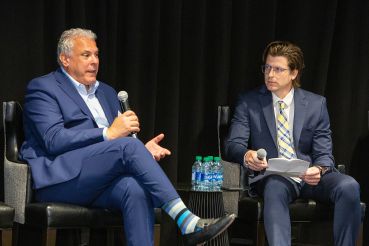 On Oct. 15, employees at Cushman & Wakefield (CWK) received an internal memo from CEO Bruce Mosler, which began, “To my colleagues: I am very pleased to announce that as of January 1, 2010, I will transition to Co-Chairman of the Board, alongside John C. Cushman III. The Board of Directors has established a search committee to select a new CEO, and I will continue in that capacity until a successor is named.”
On Oct. 15, employees at Cushman & Wakefield (CWK) received an internal memo from CEO Bruce Mosler, which began, “To my colleagues: I am very pleased to announce that as of January 1, 2010, I will transition to Co-Chairman of the Board, alongside John C. Cushman III. The Board of Directors has established a search committee to select a new CEO, and I will continue in that capacity until a successor is named.”
Few were surprised. Rumor of just such a move had been circulating within Cushman & Wakefield for months (and thanks to brokers’ propensity to gossip, outside of the firm as well).
Cushman & Wakefield, and Mr. Mosler, were intent on defining the move as a lateral one. “What we are trying to accomplish for this move is for me to return to something I am passionate about, which is client interface,” Mr. Mosler told The Commercial Observer.
Sources both inside and outside the firm say Mr. Mosler was eager to move on. They also say there are reasons why the Agnelli family, which controls Cushman & Wakefield, might not have been distraught to see him go.
It was Mr. Mosler, after all, who persuaded the Agnellis to buy a majority stake in Cushman & Wakefield in 2007, at the height of the market, for $625 million. The move was a pricey one for the Agnellis, but also helped ensure deep pockets of financing for Cushman & Wakefield.
“People who want to put the acquisition of Cushman in 2007 in a two-year context miss the point,” Mr. Mosler said to any would-be critics of the move. “I think their view of Cushman & Wakefield is that this is going to be a long-term investment and a first step in a much broader set of objectives in real estate throughout the world.”
It was also in 2007 that Mr. Mosler led the firm in its acquisition of real estate financier Sonnenblick Goldman. Months later, the economy tanked, and real estate financing virtually ceased.
“Strategically, it is still one of the best decisions the company has made, because in the long run, we believe it will be economically a good deal,” Mr. Mosler said of the Sonnenblick acquisition. “It completed our capital-markets capabilities. We believed at the time investment-sales disposition was not enough. We did not have debt and equity capability. We felt it was a glaring hole in our capital-markets basket.”


